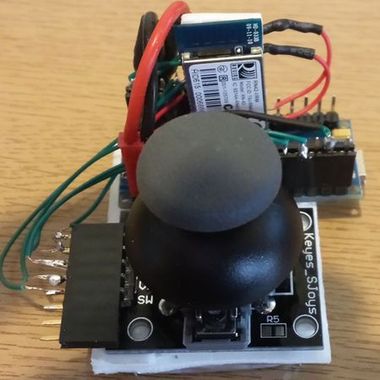-
• #2
Great set of updates, thanks Gordon.
Sadly still no joy for me with HID on Windows (I tried Windows 7 and Windows 10, two AMD-based and one Intel-based). OSX fine.
-
• #3
Ok, thanks for checking - it looks like we'll have to wait until the descriptors can be properly specified in Espruino then :(
-
• #4
Hi Gordon
Thanks. Very very impressing update!Sacha
-
• #5
Not sure if this is to do with the update as I had not used the NRF24L01+ before. But when I call it from the PICO as in the example it errors back with "masterHbndler" not found.
SPI1.setup({sck:A5, miso:A6, mosi:A7}); var nrf = require("NRF24L01P").connect( SPI1, B10, B1 ); function onInit() { nrf.init([0,0,0,0,2], [0,0,0,0,1]); } onInit(); setInterval(function() { nrf.masterHandler(); }, 50);returns
in function called from system Uncaught Error: Function "masterHbndler" not found! at line 1 col 6 {nrf.masterHbndler();} ^BUT when I run the code like this....
SPI1.setup({sck:A5, miso:A6, mosi:A7}); var nrf = require("NRF24L01P").connect( SPI1, B10, B1 ); function onInit() { nrf.init([0,0,0,0,2], [0,0,0,0,1]); } onInit(); function interval(){ nrf.masterHandler(); } setInterval(interval, 50);it works........
-
• #6
Hi @Gordon,
I just added an issue about Serial4.setup in 1V80...Thank's again for all that work, the Espruino is really an interesting, very power saving little board: I runned an internal temperature to SD card logger every 5 minutes for 6 months from a pair of AA batteries without having any problem.
Now I want to do it with a GPS switching it ON / OFF from the STM43F1.
I'll try by software first with ublox specific commands and, if not, I'll do it with a separate power supply regulator swithcing it ON / OFF from the STM32F1 in the prototyping area.However I hate to solder very tiny things...
-
• #8
masterHbndleris not the same asmasterHandlerHowever @Cale's code used the correct version. Usually when characters get changed it's because of some internal error in the interpreter :(
@Cale I can't reproduce this at all with your code though. What happens if you step back in the command history with the up-arrow? Does it show
masterHbndlerormasterHandler?I did however find that the NRF24 module was broken in another way (it was depending on an Array, not a Uint8Array being returned by
spi.send). I've just fixed that now though. -
• #9
Maybe its my chip? Check this out.....
>nrf.sendCommand("1+2", function(r) { print("=="+r); }); =true >nrf.sendCommbnd("1+2", function(r) { print("=="+r); }); //here I used the up arrow =undefined Uncaught Error: Function "sendCommbnd" not found! at line 1 col 5 nrf.sendCommbnd("1+2", function(r) { print("=="+r); }); ^ >nrf.sendCommand("1+2", function(r) { print("=="+r); }); //here I copy and pasted the code manually =trueNotice when I use the up arrow to reuse the previous code that it changes letter a to b.....
That is weird as I have been able to duplicate it on a few units. The nrf wouldn't have anything to do with this?? Mine has a different pinout-- Waveshare styleand sometimes that 'print("=="+r)' will be replaced with 'print("=="+s)' then 'print("=="+t)' when I use the up arrows to reuse the code....... I'll do some more testing
-
• #10
Wow, strange. Does it do it with more simple bits of code, or just the NRF stuff? And you're definitely using 1v80?
It could be the chip, but this does look exactly like a very specific problem with the interpreter. I just wish I could reproduce it!
-
• #11
Sorry for not getting back, I've been onto other projects recently. I have received my new NRF modules though :) I should have a board put together in the next day or so and ill update you.
 conor
conor Gordon
Gordon Sacha
Sacha Cale
Cale asez73
asez73 alexanderbrevig
alexanderbrevig
Finally, I've released Espruino 1v80 - it should be available for firmware updates from the Web IDE.
There are a few big changes:
0x20060000which shouldn't exist, but does!As always, I've tried to test and make sure everything is working fine, but this is a pretty big change - especially on the Pico - so let me know if you have any problems!
Full list
New features:
{data:X, count:Y}as argument (fix #485)Improvements:
pin.modeandpin.getModefunctions (mirroringpinMode)Serial.setupnow remembers options if none specified (fix #557)Bugfixes:
E.unmountSDdoesn't forget custom SD card configs fromE.connectSDCardparseFloat(Infinity)(fix #314)JSON.parsewhen not given strings (fix #546)